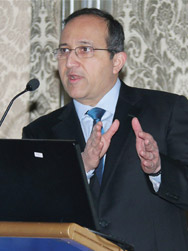
The Gateway presents an interview with Professor Dhurandhar
The Gateway (TG): Fat represents stored energy in our body. So people with excess fat shouldn’t feel hunger pangs as their body should instead be burning their excess fat to provide energy for their needs. Why do overweight and obese people feel the need to eat more, instead of their bodies using up stored energy reserves?
Nikhil Dhurandhar (ND): There can be multiple factors leading to obesity. One possible cause is the inadequacy of the protein Leptin in the body. Leptin is made by the fat cells. This protein tells the brain how much fat is stored and this helps the brain send the signal to reduce hunger pangs and/or increase the metabolic rate to burn more calories. The deficiency of Leptin in a person which acts as a messenger to the brain aids obesity. A normal person’s body has controls in place to manage their weight in a range of values. But a breakdown of this self regulation can happen due to a variety of reasons. The Obesity Society has outlined a list of 90 possible contributors to this condition.
TG: Often overweight people who are prescribed an exercise regimen feel ravenous after a work-out and tend to binge eat thereafter. How can one guard against this tendency that can undo all such gains?
ND: Exercise by itself has no role to play in weight loss unless its combined with a diet. Yes exercise helps build muscle and helps the cardio vascular system. But for weight loss it needs to be accompanied by dietary restrictions. Strategies are needed to cope with temptations. For instance, an individual could work out right before dinner so as to ensure he or she eats home cooked food when hungry. Eating dinner at home, post the workout, is one way to avoid bingeing. Another option is to eat a protein bar post a workout if there’s a long time interval between the workout and the main meal. The key here of course is to eat a measured amount.
One has to be vigilant as the amount of calories burnt by exercise isn’t very much. For instance a 1.6 kms. walk will burn around 100 calories. If u eat a single bhel puri you are putting on 225 calories while an egg gives you 75 calories
Appetite is regulated by the hormones Ghrelin and PYY. When Ghrelin levels rise in the body, you feel hungry and when PYY levels rise you feel satiety. People with obesity often have delayed onset of PYY and therefore need more time before their brain signals that they are full. This is one example of how physiology influences one’s food intake.
TG: In the Indian context we find that one cause for excess weight gain especially amongst women is when they get pregnant. That time conventional wisdom has it that they should eat a lot of fattening food to gain weight. Similarly post childbirth, the lactating mother is often fed a rich diet ostensibly to help the development of the child. How do women deal with these situations?
ND: The first thing to remember is that women need to control their weight gain during pregnancy. An increase of 20-25 pounds is normal but if its way over that, then efforts to reduce must be made then. Lactating mothers need to consume adequate amounts of protein and water to ensure production of breast milk. Excess consumption of rich food is not a pre requisite for lactation.
